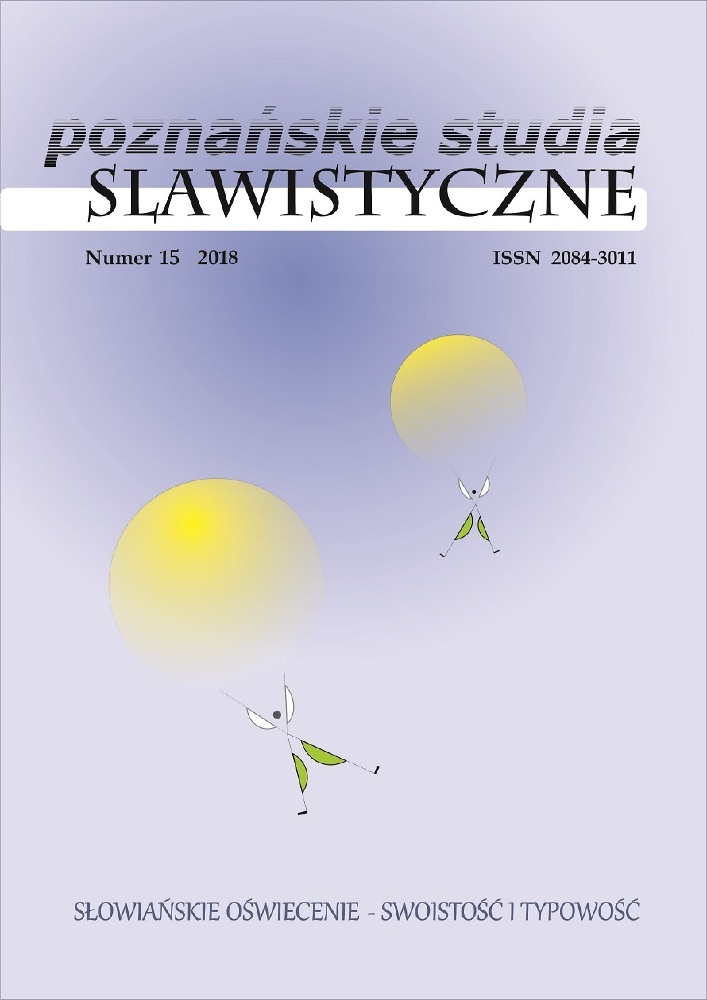Abstract
Some Belarusian philosophical-allegoric novel renewal periods have been studied closely with the emphases on the historic, social and cultural heritage of different epochs. In the article, the decisive role of the Enlightenment French philosophical prose is noted in the development of the modern Belarusian philosophical-allegoric novel. The Enlightenment French philosophical-allegoric text is a model of reality, simple for understanding, with a fascinating adventure story, but with an obscure moral and philosophical attitude and didacticism. The 18th century philosophical-allegoric prose is distinguished by the parable form of narrative, which is characterized by moral and philosophical problems, global questions about the life and destiny of people, marked by didacticism, by a high degree of generalization, and the obligatory projection of the idea on the reader views. The article proves the influence of Montesquieu, Voltaire, and Diderot’ philosophical works on the development of the modern philosophical-allegoric novel in Belarusian literature. The article analyzes the poetics of Belarusian contemporary works of this genre taking into account the French traditions of the Enlightenment.References
Adamovič, A. (1987). Poslednââ pastoral’. Minsk: Novyj mir.
Artamonov, S. (1960). Filosofskie povesti Vol’tera. V: Vol’ter. Filosofskie povesti. Moskva: Gosudarstvennoe izdatel’stvo hudožestvennoj literatury, s. 328–340.
Bondar, T. (1998). Blagaslaŭlenne Maryì. „Polymâ”: Lìt.-mastackì ì gramadska-palìtyč. Časopìs, nr 10, s. 17–97.
Bykaŭ, V. (2005). Poŭny zbor tvoraŭ, u 14 t. Mìnsk: Saûz belaruskìh pìs’men’nìkaŭ, t. 1.
Dornier, S. (2013). Lectures de Montesquieu: „Lettres persanesˮ. Rennes: Presses Universitaires de Rennes.
Jilevich, O. (2016). Phenomenon of a solitary person in the parable literature. V: Gosudarstva Central’noj i Vostočnoj Evropy v istoričeskoj perspektive. Sbornik naučnyh statej po materialam meždunarodnoj naučnoj konferencii. Red. R. Gagua. Pinsk: Polesskij gosudarstvennyj universitet, s. 283–289. https://elibrary.ru/item.asp?id=30651138.
Karatkevìč, U. (2000). Hrystos pryzâmlіŭsâ ŭ Garodnі. Mìnsk: Bellіtfond.
Kaz’ko, V. (2013). Bunt nezapatrabavanaga krahu. Mìnsk: Mastackaâ lіtaratura.
Mìnkìn, A. (1994). Praŭdzіvaâ gіstoryâ kraіny hludaŭ. Mìnsk: Mastackaâ lіtaratura.
Montesk’e, Š.-L. (1855). Polnoe sobranie sočinenij. S kommentariâmi pisatelej: Vol’tera, Dûpina, Krev’era, Mable i dr. [Oeuvres complètes de Montesquieu. Avec des notes de Dupin, Crevier, Voltaire, Mably, Servan, La Harpe, etc. Na fr. âz.]. Pariž: Lefevr.
Nâklâeŭ, U. (2009). Vybranyâ tvory. Mìnsk: Knìgazbor.
Pâtrovìč, B. (1994). Son mìž pačvar. Mìnsk: Mastackaâ lìtaratura.
Rialland, N. (2013). Roman et philosophie au temps des Lumières. Paris: CNRS Éditions.
Spector, C. (1997). Montesquieu, les «Lettres persanes» : de l'anthropologie à la politique. Paris: Presses Universitaires de France. https://doi.org/10.3917/puf.spect.1997.01
Vol’ter (1998). Sobranie sočinenij v 3 tomah. Moskva: Literatura, Sigma-press, RIK Rusanova.
Zababurova, N.V. (1999). Francuzskij filosofskij roman XVIII veka: samosoznanie žanra. V: XVIII vek: literatura v kontekste kul’tury. Moskva: Izdatel’stvo URAO, s. 94–104.
License

This work is licensed under a Creative Commons Attribution-NoDerivatives 4.0 International License.

